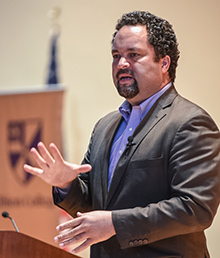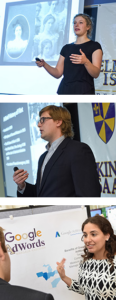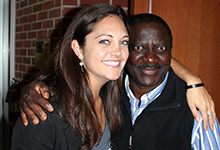The Power of the Individual on Display at 2016 Isaac Symposium
And together, magic happens, as showcased by Benjamin Jealous, Mallory Brown, ’08, and more than 130 Albion College students
April 22, 2016

Jealous’ stirring Calvaruso Keynote was titled “The Secret to Unleashing Inner Greatness.”
By Jake Weber
Extraordinary accomplishments by extraordinary individuals—and a reminder that supporters are important, too—were a big part of Albion College’s 27th annual Elkin R. Isaac Student Research Symposium, held April 20-21.
A last-minute replacement for scheduled presenter Morris Dees, former NAACP President and CEO Benjamin Jealous delivered the Symposium’s closing Joseph S. Calvaruso Keynote on Thursday evening, April 21 in Goodrich Chapel. Jealous brought compelling personal stories to illustrate the power of individuals with focused vision. He noted that his own beginnings in activism came at a friend’s birthday celebration, where gathered friends toasted not only the birthday honoree, but a number of friends who hadn’t made it to that age.
“The notion cut me like a knife: that somebody thought it was an accomplishment for a young black man to survive, to breathe past his 21st birthday, left me stunned,” he said.
This realization, and a long bus ride to New York, were turning points for Jealous. He made a list of his most troubling social concerns, determined to choose one to pursue before exiting the bus.

Student symposium presenters included, from top, Audrey DeGroot, ’16, Spencer Gust, ’16, and Margaux Kabodian, ’16.
“I closed my eyes and drew a circle and said, ‘Whatever is closest to the center of the circle, that’s what I will strive for. I opened my eyes in the Port Authority Bus Terminal and I had circled ‘End the injustice in the justice system.’ And I thought, ‘I have no idea how to do that.'”
As Jealous struggled to find a starting point, “a funny thing happens when you commit yourself to a goal you don’t know how to do,” he said. “A light goes on, and it becomes just bright enough for you to see the next step, and the next. You start with this little light of mine and end up being on fire.”
Jealous shared a major lesson he learned when, fresh out of Columbia University, he went to Mississippi to fight the state’s decision to close two historically black universities. As his organization struggled to identify white protesters to join his group, Jealous had an encounter with a man who appeared to be hostile, but actually wanted to offer support.
“He called us ‘boy’ twice—he was maybe the most grammatically challenged ally we’d ever seen,” Jealous recalled. “From that day forward, we greeted every Mississippian we met assuming they had the conscience and integrity to understand that there’s one thing we don’t do in Mississippi, I don’t care who you are, is turn a college into a prison.”
Jealous then proceeded to describe the work of Jotaka Eaddy, who began her fight to abolish the death penalty for juveniles while still in high school. Eaddy would go on to play key roles in convincing several states and the U.S. Supreme Court to eventually abolish laws allowing the practice.
“If you do anything in these next 16 days,” Jealous concluded to College seniors in attendance, “promise me you’ll do this. Figure out what one thing you’ll go and change.
“The next best thing to figuring out the perfect thing to work on until you die—is to figure out something that’s pretty good. If you light that light inside and follow the path it shows you, it’s likely you’ll achieve that victory faster than you thought possible.”
The Symposium began Wednesday evening, April 20, with the Isaac Alumni Lecture, given by humanitarian and social entrepreneur Mallory Brown, ’08. Brown presented “Lessons Learned in a Mud Hut,” sharing her evolution from innocent backpacker to “buy one, give one” business founder to her newest role developing 24-hour philanthropic programs promoted through CrowdRise.

Mallory Brown with French professor Emmanuel Yewah following her lecture.
Since 2015, Brown has raised more than $100,000 for campaigns that have benefited homeless Americans, disaster relief in Nepal, African orphans and Ecuadorian teens in need of medical care. Brown’s next project, scheduled for June 2016, will help 30 women in Ethiopia establish small businesses.
“I try to bring a personal side to charity,” she commented. “If I can make a bunch of people fall in love with a little girl, it brings awareness of health care, personified by her.
“I go for the ripple effect,” she added. “Someone might give to my fundraiser and that might inspire them to help in another place. In the grand scheme of things, fundraisers raise millions of dollars and I do little bits. But all those little bits make a difference.”